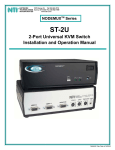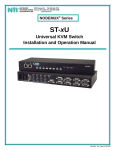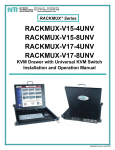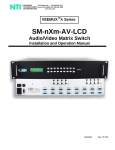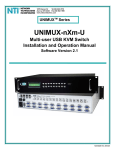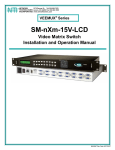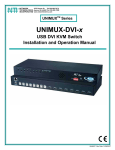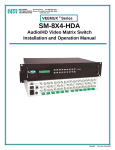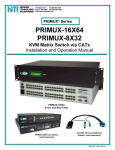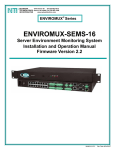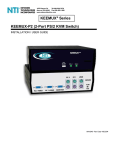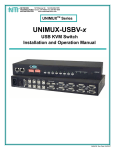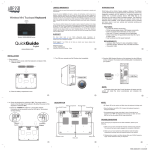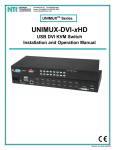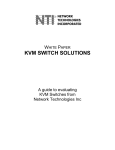Download Network Technologies ST-nXm-U User's Manual
Transcript
NTI R 1275 Danner Dr Tel:330-562-7070 NETWORK TECHNOLOGIES Aurora, OH 44202 Fax:330-562-1999 INCORPORATED www.networktechinc.com NODEMUX ® Series ST-nXm-U Multi-user Universal KVM Switch Installation and Operation Manual Software Version 1.34 MAN044 Rev Date 3/9/2007 TRADEMARK NODEMUX is a registered trademark of Network Technologies Inc in the U.S. and other countries. COPYRIGHT Copyright © 2000-2007 by Network Technologies Inc. All rights reserved. No part of this publication may be reproduced, stored in a retrieval system, or transmitted, in any form or by any means, electronic, mechanical, photocopying, recording, or otherwise, without the prior written consent of Network Technologies Inc, 1275 Danner Drive, Aurora, Ohio 44202. CHANGES The material in this guide is for information only and is subject to change without notice. Network Technologies Inc reserves the right to make changes in the product design without reservation and without notification to its users. i MAN044 Rev Date 3/9/2007 TABLE OF CONTENTS INTRODUCTION............................................................................................................................................................. 1 Features....................................................................................................................................................................... 1 Compatibility ................................................................................................................................................................ 1 Ordering Information.................................................................................................................................................... 3 ST-nXm-U Switch ..................................................................................................................................................... 3 Materials ................................................................................................................................................................... 3 Interface Cables........................................................................................................................................................ 4 FEATURES AND FUNCTIONS ...................................................................................................................................... 5 RACK MOUNTING INSTRUCTIONS ............................................................................................................................. 6 INSTALLATION & CONFIGURATION........................................................................................................................... 7 Cable Selection Guide For CPU and Keyboard/Mouse ............................................................................................ 10 USING THE NTI NODEMUX UNIVERSAL KVM SWITCH .......................................................................................... 11 Basic Operation ......................................................................................................................................................... 11 Keypad Control .......................................................................................................................................................... 11 OSD Control .............................................................................................................................................................. 12 Security Option with Password ............................................................................................................................... 12 Enabling The Security Feature ............................................................................................................................... 12 Password and User Name ................................................................................................................................ 12 OSD Modes Available With Security Enabled ........................................................................................................... 13 User Login............................................................................................................................................................... 13 Administration ......................................................................................................................................................... 13 Port Status .............................................................................................................................................................. 14 Administration Options............................................................................................................................................ 14 User Name List ....................................................................................................................................................... 15 System Access List................................................................................................................................................. 15 User Access Functions .............................................................................................................................................. 16 Command Mode ..................................................................................................................................................... 16 Edit Mode................................................................................................................................................................ 17 Search Mode........................................................................................................................................................... 18 Maintenance Mode ................................................................................................................................................. 18 Help Mode............................................................................................................................................................... 19 SUN DDC Configuration ............................................................................................................................................ 19 RS232 CONTROL......................................................................................................................................................... 20 Remote Connection ................................................................................................................................................... 20 Baud Rate ............................................................................................................................................................... 20 Unit Address and Loop Back .................................................................................................................................. 20 RS-232 Command Protocol....................................................................................................................................... 22 RS-232 Command Protocol Quick Reference........................................................................................................ 22 Autostatus .......................................................................................................................................................... 22 Matrix Switcher's Control Program For Windows 9X, NT, 2000 and XP................................................................... 23 SerTest- RS232 Interface Test Program ................................................................................................................... 24 Main Options........................................................................................................................................................ 24 Matrix Operations ................................................................................................................................................ 24 Setup Options ...................................................................................................................................................... 25 RMTEST-RS232 Interface Test Program.................................................................................................................. 25 Main Options........................................................................................................................................................... 25 Matrix Options......................................................................................................................................................... 25 Setup Options ......................................................................................................................................................... 25 KEYBOARD MAPPING ................................................................................................................................................ 26 Key Equivalents ......................................................................................................................................................... 26 SUN's Startup Keys ................................................................................................................................................... 26 TROUBLESHOOTING.................................................................................................................................................. 28 SPECIFICATIONS ........................................................................................................................................................ 28 INDEX............................................................................................................................................................................ 29 WARRANTY INFORMATION ....................................................................................................................................... 29 ii MAN044 Rev Date 3/9/2007 TABLE OF FIGURES Figure 1- Mount the NODEMUX to a rack....................................................................................................................... 6 Figure 2- Connect monitor to NODEMUX ....................................................................................................................... 7 Figure 3- Connect PS/2 devices to NODEMUX .............................................................................................................. 8 Figure 4- Connect PS/2 CPU to NODEMUX................................................................................................................... 9 Figure 5- Cable Selection Guide ................................................................................................................................... 10 Figure 6- Login screen .................................................................................................................................................. 12 Figure 7- Administration Mode ...................................................................................................................................... 13 Figure 8- Port Status for Port 1 ..................................................................................................................................... 14 Figure 9- Administration Options menu......................................................................................................................... 14 Figure 10- User Name List ............................................................................................................................................ 15 Figure 11- System Access List...................................................................................................................................... 15 Figure 12- Command Mode main menu ....................................................................................................................... 16 Figure 13- Maintenance Mode menu ............................................................................................................................ 19 Figure 14- RS232 connection with "IN" and "OUT" ports.............................................................................................. 20 Figure 15- RS232 connection with Matrix-Y-1 cable..................................................................................................... 21 Figure 16- Matrix-Y-1 wiring schematic......................................................................................................................... 21 Figure 17- Keyboard key layouts .................................................................................................................................. 27 iii MAN044 Rev Date 3/9/2007 NTI NODEMUX MULTI-USER UNIVERSAL KVM SWITCH INTRODUCTION The NTI ST-nXm-U (NODEMUX) is a multi-user / universal KVM switch, (n= number of users, m= number of CPUs). It allows multiple users, up to 8, each with a keyboard, monitor, and mouse, to communicate directly with any PC or SUN workstation connected to the switch. A single switch can connect to up to 32 CPUs. These CPUs can be file servers, network managers, etc. The auto-boot circuitry in the NODEMUX allows all CPUs to boot simultaneously without keyboard and/or mouse error. Features ¾ Users can work individually or share the same CPU. ¾ Up to n users can work with m CPUs where n and m are the switch size acquired. ¾ Universal input and output ports that interface cables plug into adapt to PC and SUN platform devices. ¾ Power cycle circuit control allows the NTI switch to be powered OFF, then ON, at any time without affecting the attached CPUs. ¾ Power cycle circuit control allows the attached CPUs to be powered OFF, then ON, at any time without affecting the switch or other attached CPU. ¾ OSD enabled system with security features optionally enabled on a port by port basis. ¾ A microprocessor is dedicated to each CPU, preventing connected CPUs from locking up. ¾ Each connected CPU can boot without a keyboard or mouse. ¾ Keyboard and mouse interface cable can be hot-plugged during operation. ¾ LCD display on the front panel shows the CPU to which each user is connected. ¾ 10 connection setups can be saved in memory by the user for instant setup recall. ¾ No dip switches or jumpers necessary to configure. ¾ Video formats up to 1900X1200 can be displayed from all platforms. (A VGA multi-scan monitor must be used) ¾ User’s keyboard and mouse can control the switch using the On Screen Display (OSD) of each user’s connections ¾ Names can be assigned to the CPUs ¾ Password security on a PORT enabled basis. ¾ RS-232 control allows control of the switch with one CPU serial port. ¾ Power required is 110 or 220 VAC @ 50-60 Hz at less than 25 watts. Compatibility Supported CPUs: • All PS/2 style PCs • PS/2 laptops • IBM RS6000 • Silicon Graphics • HP9000 • Supports SUN, including ULTRAs™, SUN Blade™ 100, SUN Blade 1000, SUN Fire™ 280R, SUN Fire V20z and SUN Ray™ (using NTI’s USB-SUN adapter). Supported Mice: • Compatible with all standard 2-button PS/2 mice as well as the following: • Microsoft IntelliMouse® • Logitech (and other) 3-button mice. • Alps glidepoint touchpad (extended functions-i.e. tapping, etc.-are not supported). • Cirque Glidepoint touchapd. • IBM Scroll Point mouse (extended stick functions are not supported). • Kensington Orbit trackball. • Logitech 2-button wheel mouse. • Microsoft Ballpoint mouse. • SUN 3-button mice are supported. Wheel button on IntelliMouse emulates SUN's third mouse button. 1 NTI NODEMUX MULTI-USER UNIVERSAL KVM SWITCH Supported Keyboards • User devices can be PS/2 or SUN. • SUN startup keys are supported on all platforms of input devices. • Keystrokes are translated across platforms. • Keyboard is hot-pluggable. • Internet and Windows key supported. Supported Monitors: • Multiscan SVGA, XGA, and VGA monitors See our catalog, visit our website at www.networktechinc.com, or contact an NTI sales representative at 800-742-8324 (800-RGBTECH) or 330-562-7070 for more details. 2 NTI NODEMUX MULTI-USER UNIVERSAL KVM SWITCH Ordering Information ST-nXm-U Switch The ST-nXm-U switch is built to a specific size ranging from 2 to 8 users and 8 to 32 CPUs. The switch is built at the factory based on the specified size ordered. The switch has universal inputs and outputs that support all platforms and are configured with interface cables (see " Interface Cables" below). The “n” in the part number ST-nXm-U represents the number of users. Select either 2 ,4, or 8 user switches. The “m” in the part number represents the number of CPUs. The switch is available with support for either 8 , 16,or 32 CPUs. It is not necessary to connect a user or CPU to each port (ex. a ST-2x16 switch has the capability of supporting 16 CPUs, but can have only 10 CPUs connected and 6 empty ports. ST-nXm-U Replace the “n” with either 2,4, or 8 Replace the “m” with either 8,16, 24, or 32 The following list represents the available sizes that can be ordered: ST-2X2-U* ST-4X8-U* ST8X8-U ST-2X4-U* ST-4X16-U ST8X16-U ST-2x8-U* ST-4X32-U ST8X24-U ST-2x16-U ST8X32-U ST-2X32-U *This size is also available in a desktop style case instead of a rack mount case- just add "DT" when ordering Materials Materials Supplied with this kit include: • • • • • NTI ST-nXm-U Multi-user Universal KVM Switch Power cord- country specific 120 or 240VAC at 50 or 60Hz-5VDC/4A AC Adapter (models ST-2X2-UDT, ST-2X4-UDT, ST-2X8-UDT, and ST-4X8-UDT only) 8-#10-32 x 3/4" pan head screws and #10-32 cagenuts (server cabinet mounting hardware) CD with pdf file of this manual 3 NTI NODEMUX MULTI-USER UNIVERSAL KVM SWITCH Interface Cables Interface cables are not included and must be purchased separately. A set of 2 cables for each CPU being connected to the switch: PS/2 CPU to Switch VEXT-xx-MM for video interface VKTINT-xx-MM for keyboard and mouse interface OR SUN CPU to Switch VEXT-xx-MM for video interface 13W3M-15HDF (adapter for 13W3 to 15HD) SKTINT-xx-MM for keyboard/mouse interface One of the following cables must be used to connect the keyboard/mouse: PS/2 keyboard/mouse VKTINT-1 OR SUN keyboard/mouse None needed. SUN keyboard plugs directly in. where: xx is the length of the cable in feet MM indicates male-to-male connector, and MF indicates male-to-female connector. See also, page 10, for Cable Selection Guide. Cables can be purchased from Network Technologies Inc by calling 800-RGB-TECH (800-742-8324) or (330)-562-7070 or by visiting our website at www.networktechinc.com. Custom cable lengths are available – contact NTI for pricing and distance / resolution limitations. 4 NTI NODEMUX MULTI-USER UNIVERSAL KVM SWITCH 2 1 NODEMUX TM NTI R ESC USR 6 7 8 9 0 * MENU CPU 1 2 3 4 5 ENTER Network Technologies Inc DDC Front View of NODEMUX FEATURES AND FUNCTIONS 1. Keypad- buttons for user control over switch functions 2. LCD Display- for visual indication of connection between the user and a specific CPU. 3. CPU x- 8 pin miniDIN female connectors- for connection of CPU device cables 4. User x- 8 pin miniDIN female connectors- for connection of user device cables 5. Power switch- for powering the NODEMUX On/Off 6. IEC Power Connector- for attachment of power cord (not available on all units) 7. Fuse Holder- holder for replaceable 2A 240VAC overcurrent protection fuse (not available on all units) 8. RS232- for attaching RS232 interface cable from a CPU to control the functions of one or more switches 9. MONITOR x- 15HD female connectors- for connection of user monitors 10. VIDEO x- 15HD female connectors- for attachment of video cables from CPUs 3 4 Rear View of NODEMUX USER 4 USER 3 USER 2 USER 1 NTI R NETWORK 1275 Danner Dr Tel:330-562-7070 TECHNOLOGIES INCORPORATED Aurora, OH 44202 Fax:330-562-1999 www.nti1.com CPU 16 CPU 15 CPU 14 CPU 13 CPU 12 CPU 11 CPU 10 CPU 9 R S 2 3 2 5 6 7 CPU 8 CPU 7 CPU 6 CPU 5 CPU 4 CPU 3 CPU 2 CPU 1 MONITOR 3 MONITOR 1 VIDEO 15 VIDEO 13 VIDEO 11 VIDEO 9 VIDEO 7 VIDEO 5 VIDEO 3 VIDEO 1 MONITOR 4 MONITOR 2 VIDEO 16 VIDEO 14 VIDEO 12 VIDEO 10 VIDEO 8 VIDEO 6 VIDEO 4 VIDEO 2 8 9 10 5 NTI NODEMUX MULTI-USER UNIVERSAL KVM SWITCH RACK MOUNTING INSTRUCTIONS This NTI switch was designed to be directly mounted to a rack. It includes a mounting flange to make attachment easy. Install 4 cage nuts (supplied) to the rack in locations that line up with the holes (or slots) in the mounting flange on the NTI switch. Then secure the NTI switch to the rack using four #10-32 screws (supplied). Be sure to tighten all mounting screws securely. Note: Do not block power supply vents in the NTI switch chassis (if provided). front of and behind the NTI switch. Be sure to allow for adequate airflow in Attach all cables securely to the switch and where necessary supply adequate means of strain relief for cables. Rack Cage Nuts (supplied) 10-32 Rack Screws (supplied) Figure 1- Mount the NODEMUX to a rack 6 NTI NODEMUX MULTI-USER UNIVERSAL KVM SWITCH INSTALLATION & CONFIGURATION Power OFF all CPUs that will be connected to the NTI Switch before connecting or disconnecting any cables. WARNING! CPUs may be damaged if cables are connected or disconnected while power is ON. 1. Connect the monitors to the ports labeled "MONITOR x" on the rear of the NODEMUX. Rear View of NODEMUX USER 4 USER 3 USER 2 NTI USER 1 R NETWORK TECHNOLOGIES INCORPORATED 1275 Danner Dr Tel:330-562-7070 Aurora, OH 44202 Fax:330-562-1999 www.nti1.com CPU 16 CPU 15 CPU 14 CPU 13 CPU 12 CPU 11 CPU 10 R S 2 3 2 CPU 9 CPU 8 CPU 7 CPU 6 CPU 5 CPU 4 CPU 3 CPU 2 CPU 1 MONITOR 3 MONITOR 1 VIDEO 15 VIDEO 13 VIDEO 11 VIDEO 9 VIDEO 7 VIDEO 5 VIDEO 3 VIDEO 1 MONITOR 4 MONITOR 2 VIDEO 16 VIDEO 14 VIDEO 12 VIDEO 10 VIDEO 8 VIDEO 6 VIDEO 4 VIDEO 2 MONITOR 1 15HD Male Video Connector 15HD Female Video Connector VGA Multi-Scan Monitor Figure 2- Connect monitor to NODEMUX 7 NTI NODEMUX MULTI-USER UNIVERSAL KVM SWITCH 2. Connect the keyboards to the ports labeled "USER x" on the rear of the NTI Switch. (See Figure 3) Use the proper interface cables. (See also Cable Selection Guide on page 10.) Insure that the monitors and related keyboards have the same port numbers. FYI: If it is desired for only a monitor to be connected to a set of user ports, an NTI keyboard cable (VKTINT-1 for example) must also be connected to the keyboard port for that user. (The other end of the VKTINT-1 does not need to be connected to anything.) This is required in order to enable the user of that port to switch between CPU ports on the NTI Universal KVM switch. (See Figure 5- Cable Selection Guide on page 10 "Video-Only User".) Rear View of NODEMUX USER 4 USER 3 USER 2 USER 1 NTI R NETWORK TECHNOLOGIES INCORPORATED 1275 Danner Dr Tel:330-562-7070 Aurora, OH 44202 Fax:330-562-1999 www.nti1.com CPU 16 CPU 15 CPU 14 CPU 13 CPU 12 CPU 11 CPU 10 R S 2 3 2 CPU 9 CPU 8 CPU 7 CPU 6 CPU 5 CPU 4 CPU 3 CPU 2 CPU 1 MONITOR 3 MONITOR 1 VIDEO 15 VIDEO 13 VIDEO 11 VIDEO 9 VIDEO 7 VIDEO 5 VIDEO 3 VIDEO 1 MONITOR 4 MONITOR 2 VIDEO 16 VIDEO 14 VIDEO 12 VIDEO 10 VIDEO 8 VIDEO 6 VIDEO 4 VIDEO 2 8 miniDIN Male Connector 6mD Female Connectors Purple- Keyboard VKTINT-1 Green- Mouse PS/2 MOUSE PS/2 KEYBOARD Figure 3- Connect PS/2 devices to NODEMUX 3. For each CPU: Connect a cable from the Keyboard port of the CPU to a port labeled "CPU x" on the NODEMUX. (See Figure 4 on page 9 and Cable Selection Guide on page 10.) Note the port’s number. 8 NTI NODEMUX MULTI-USER UNIVERSAL KVM SWITCH 4. Connect a VEXT-xx-MM (and adapter if needed) from the video port of the CPU to a port labeled "VIDEO x" on the NODEMUX with the same port number as the keyboard. Make sure the CPU is connected to a "CPU x" port and a "VIDEO x" port with the same number. Otherwise the user's typing may be going to one CPU, but the user will be viewing a different CPU on the monitor. 8 miniDIN Female Connector CPU 1 Rear View of NODEMUX USER 4 USER 3 USER 2 USER 1 NTI R NETWORK TECHNOLOGIES INCORPORATED 1275 Danner Dr Tel:330-562-7070 Aurora, OH 44202 Fax:330-562-1999 www.nti1.com CPU 16 CPU 15 CPU 14 CPU 13 CPU 12 CPU 11 CPU 10 R S 2 3 2 CPU 9 CPU 8 CPU 7 CPU 6 CPU 5 CPU 4 CPU 3 CPU 2 CPU 1 MONITOR 3 MONITOR 1 VIDEO 15 VIDEO 13 VIDEO 11 VIDEO 9 VIDEO 7 VIDEO 5 VIDEO 3 VIDEO 1 MONITOR 4 MONITOR 2 VIDEO 16 VIDEO 14 VIDEO 12 VIDEO 10 VIDEO 8 VIDEO 6 VIDEO 4 VIDEO 2 VIDEO 1 Rear View of PS/2 CPU 6mD Male Connectors 15HD Female Video Connector 8 miniDIN Male Connector Input Device Ports Beige Purple- Keyboard VKTINT-xx-MM Green- Mouse 6 miniDIN Female Video Port VEXT-xx-MM 15HD Female Video Connector 15HD Male Video Connector Figure 4- Connect PS/2 CPU to NODEMUX 5. Plug the NTI Switch into an AC power outlet. 6. Turn ON power to the NTI Switch, the LCD should illuminate. 7. Turn ON power to any or all CPUs connected to the NTI Switch. FYI: The order in which the CPUs and switch are turned ON does not matter. A power strip can be used. 9 NTI NODEMUX MULTI-USER UNIVERSAL KVM SWITCH Cable Selection Guide For CPU and Keyboard/Mouse existing mouse existing keyboard VKTINT-1 existing Keyboard cable VKTINT-xx-MM USER 4 USER 3 USER 2 NTI USER 1 USER 4 R NETWORK 1275 Dan ner Dr Tel :330-562-7070 TECHNOLOGIES Auro ra, OH 44202 Fax:330-562-1999 INCORPORATED USER 3 USER 2 NTI USER 1 www .nti 1.com CPU 16 CPU 15 CPU 14 CPU 13 CPU 12 CPU 11 CPU 10 CPU 9 CPU 8 CPU 7 CPU 6 CPU 5 CPU 4 CPU 3 CPU 2 R NETWORK 1275 Dan ner Dr Tel :330-562-7070 TECHNOLOGIES Auro ra, OH 44202 Fax:330-562-1999 INCORPORATED www .nti 1.com CPU 16 CPU 15 CPU 14 CPU 13 CPU 12 CPU 11 CPU 10 CPU 1 CPU 9 CPU 8 CPU 7 CPU 6 CPU 5 CPU 4 CPU 3 CPU 2 CPU 1 USER 4 USER 3 USER 2 NTI USER 1 R NETWORK 1275 Dan ner Dr Tel :330-562-7070 TECHNOLOGIES Auro ra, OH 44202 Fax:330-562-1999 INCORPORATED www .nti 1.com CPU 16 CPU 15 CPU 14 CPU 13 CPU 12 CPU 11 CPU 10 MONIT OR 3 R S 2 3 2 MONIT OR 4 MONIT OR 1 VIDEO 15 MONIT OR 2 VIDEO 13 VIDEO 16 VIDEO 11 VIDEO 14 VIDEO 9 VIDEO 12 VIDEO 7 VIDEO 10 VIDEO 5 VIDEO 8 VIDEO 3 VIDEO 6 VIDEO 1 VIDEO 4 VIDEO 2 R S 2 3 2 MONIT OR 3 MONIT OR 1 VIDEO 15 VIDEO 13 VIDEO 11 VIDEO 9 VIDEO 7 VIDEO 5 VIDEO 3 VIDEO 1 MONIT OR 4 MONIT OR 2 VIDEO 16 VIDEO 14 VIDEO 12 VIDEO 10 VIDEO 8 VIDEO 6 VIDEO 4 VIDEO 2 R S 2 3 2 VGA Multi-Scan Monitor CPU 8 CPU 7 CPU 6 CPU 5 CPU 4 CPU 3 CPU 2 CPU 1 MONIT OR 1 VIDEO 15 VIDEO 13 VIDEO 11 VIDEO 9 VIDEO 7 VIDEO 5 VIDEO 3 VIDEO 1 MONIT OR 4 MONIT OR 2 VIDEO 16 VIDEO 14 VIDEO 12 VIDEO 10 VIDEO 8 VIDEO 6 VIDEO 4 VIDEO 2 existing monitor cable existing monitor cable CPU 9 MONIT OR 3 VEXT-xx-MM VGA Multi-Scan Monitor Mouse Keyboard PC PS/2 Keyboard & Mouse SUN Keyboard & Mouse VKTINT-1 (A keyboard cable is still required) (no mouse) (no keyboard) USER 4 USER 3 USER 2 USER 1 NTI R NETWORK 1275 Dan ner Dr Tel :330-562-7070 TECHNOLOGIES Auro ra, OH 44202 Fax:330-562-1999 INCORPORATED CPU 16 CPU 15 CPU 14 CPU 13 CPU 12 CPU 11 CPU 10 CPU 9 MONIT OR 3 R S 2 3 2 MONIT OR 4 MONIT OR 1 MONIT OR 2 VIDEO 15 VIDEO 16 VIDEO 13 VIDEO 14 VIDEO 11 VIDEO 12 CPU 8 VIDEO 9 VIDEO 10 CPU 7 CPU 6 VIDEO 7 VIDEO 8 CPU 5 CPU 4 VIDEO 5 VIDEO 6 CPU 3 CPU 2 VIDEO 3 VIDEO 4 USER 3 USER 2 USER 1 CPU 1 NTI USER 4 R NETWORK 1275 Dan ner Dr Tel :330-562-7070 TECHNOLOGIES Auro ra, OH 44202 Fax:330-562-1999 INCORPORATED MONIT OR 3 R S 2 3 2 MONIT OR 4 MONIT OR 1 MONIT OR 2 VIDEO 15 VIDEO 16 VIDEO 13 VIDEO 14 VIDEO 11 VIDEO 12 existing monitor cable VGA Multi-Scan Monitor USER 3 USER 2 USER 1 www .nti 1.com CPU 16 CPU 15 CPU 14 CPU 13 CPU 12 CPU 11 CPU 10 VIDEO 1 VIDEO 2 VKTINT-xx-MM SKTINT-xx-MM USER 4 www .nti 1.com CPU 9 CPU 8 VIDEO 9 VIDEO 10 CPU 7 CPU 6 VIDEO 7 VIDEO 8 CPU 5 CPU 4 VIDEO 5 VIDEO 6 CPU 3 CPU 2 VIDEO 3 VIDEO 4 VIDEO 1 VEXT-xx-MM 13W3M-15HDF Adapter R NETWORK 1275 Dan ner Dr Tel :330-562-7070 TECHNOLOGIES INCORPORATED Auro ra, OH 44202 Fax:330-562-1999 www .nti 1.com CPU 16 CPU 15 CPU 14 CPU 13 CPU 12 CPU 11 CPU 10 CPU 9 CPU 1 VIDEO 2 NTI R S 2 3 2 CPU 8 CPU 7 CPU 4 CPU 3 CPU 2 CPU 1 VIDEO 15 VIDEO 13 VIDEO 11 VIDEO 9 VIDEO 7 VIDEO 5 VIDEO 3 VIDEO 1 MONIT OR 4 MONIT OR 2 VIDEO 16 VIDEO 14 VIDEO 12 VIDEO 10 VIDEO 8 VIDEO 6 VIDEO 4 VIDEO 2 VEXT-xx-MM "Y" Adapter (supplied by PC Manufacturer) Video-Only User Laptop PC 10 CPU 5 MONIT OR 1 SUN WORKSTATION Figure 5- Cable Selection Guide CPU 6 MONIT OR 3 NTI NODEMUX MULTI-USER UNIVERSAL KVM SWITCH USING THE NTI NODEMUX UNIVERSAL KVM SWITCH Basic Operation The NODEMUX enables a user or several users to access any CPU at any time. Users can even share a CPU and work on the same project – each from their own console. Resolution is supported through 1900x1200 with no degradation – guaranteed. A Liquid Crystal Display (LCD) on the front panel indicates the port to which the user is attached. The NODEMUX can be controlled by three methods; • • • keypad control with LCD via front panel OSD control via the user devices RS-232 control (see page 20) Keypad Control The front panel keypad and LCD display allow the user to monitor switch status and route any user to any CPU on the switch. Along with the routing of the inputs to the outputs the keypad and LCD allow the users to configure the RS-232 control interface. The keypad buttons perform the following functions: Key Action ESC Cancel current action. Escape back to the main display. 0–9 Used to enter numbers. ( n ) USR The user device number can be entered (2 digits or 1 digit and ENTER) followed by the desired CPU to be connected to (2 digits or 1 digit and ENTER). CPU Used following single digit user entries. ENTER Used to enter commands or values. Up Arrow Display next 4 users and the CPUs they are connected to. (See note below.) Down Arrow Display previous 4 users and the CPUs they are connected to. (See note below.) MENU The Configuration Menu is displayed. See RS-232 control. * Activate Memory Function- 10 memory locations (0 – 9), 0 is the power ON default. - to Save current connections - to Recall connections * - USR - n (0-9) - ENTER * - CPU - n (0-9) – ENTER The following examples show various methods of routing user 3 to CPU 5. Users and CPUs can be entered as a two digit number or a one digit number followed by ENTER. USR - 3 - CPU - 5 - ENTER USR - 3 - ENTER - 5 - ENTER CPU: USR: 1 1 2 2 3 3 4 4 ESC USR 7 8 9 MENU CPU 4 5 6 * 0 1 2 3 USR - 0 - 3 - 0 - 5 0-3-0-5 ENTER Note: By default, the display will show all connections between CPUs and users, displaying 4 at a time, from the first to the last, and repeating the cycle indefinitely. If the user presses either the up or down arrow to manually view connections, the display will freeze on the chosen view. To resume the default cycle of displaying all connections, the user must press and hold either the up or down arrow for 3 seconds, and then release it. 11 NTI NODEMUX MULTI-USER UNIVERSAL KVM SWITCH OSD Control OSD superimposes a menu system on the user’s video screen with a list of all connected CPUs. OSD allows CPUs to be named (with up to 12 character names). OSD then allows selection of CPUs by that name. Connected CPUs can be listed by name or by port number. OSD Search Mode enables the user to type in the first few characters of the CPU's name and the OSD will locate it. HELP screens assist with all OSD functions. Security Option with Password The security option in the OSD Control of the NODEMUX switch enables an administrator to control access to CPU ports for each user. Up to 63 users can be created. These users have controlled access to any CPU. Only the administrator can activate or deactivate the security features on each user port. Finally, the administrator can set a maximum idle time value after which the current user will be logged out and the login screen displayed again. This time out does not function while the OSD is active. The current security status, idle time out, and scan dwell time are all saved and will be restored whenever power to the switch is cycled OFF, then ON. To reset the administrator’s password call NTI and have the device serial number of the NODEMUX switch available. Enabling The Security Feature To enable the security feature the administrator must first enter Command Mode from the keyboard using the <Ctrl> + <`> (accent key). The OSD menu will automatically appear on the monitor. This provides a visual way to control the NODEMUX switch using the keyboard and mouse. The administrator , when setting the Universal KVM switch up for the first time, may want to proceed directly to the ADMINISTRATION Mode by typing <CTRL> + <M> , then <A>, and then <Y>. Password and User Name The factory default settings are: • user name = ADMINISTRATOR • password = ADMINISTRATOR Figure 6- Login screen Note: The username for the administrator cannot be changed from "ADMINISTRATOR". Once logged-in, follow the instructions on page 14 for setting up users and changing the administrator password. Once the password is setup, if it is lost or forgotten, the administrator will have to contact NTI for assistance on clearing the password and set it up again. Within the ADMINISTRATION Mode the administrator can setup each of the users and the limitations of their use of the individual CPUs on the system. When a standard user powers up the system a security screen may appear as setup by the administrator. The user will need to login to the system by following the instructions below for the USER LOGIN. If the user does not know the appropriate user name and password (setup by the administrator), contact the system administrator for this information. Once logged-in a user can follow the Command Functions described on page 16 to control the system of CPUs within the limitations as determined by the administrator. 12 NTI NODEMUX MULTI-USER UNIVERSAL KVM SWITCH OSD Modes Available With Security Enabled User Login User login mode requires a user to login with a user name and password from the list created by the Administrator. Key Alphanumeric Backspace Enter Esc Function Adds a character to the user name/password. Removes previous character from the user name/password Submit user name/password Exit USER LOGIN and return to previous mode. This function is only available if security is not currently active. The Administration, Port Status, Administration Options, User Name List, and System Access List modes are only available if the following conditions are met: 1. The security feature has been enabled 2. The administrator is currently logged in Administration Administration mode (press <A> from the Maintenance Mode menu) allows the administrator to select a port for extended status information, or choose one of the following options: Key A Enter Esc Function Enter Administration Options mode Enter Port Status mode for selected port Exit ADMINISTRATION and return to previous mode Figure 7- Administration Mode The mouse can be used to control administration mode as well as the keyboard. Ports can be selected that are on the screen by moving the cursor onto that port and clicking. Clicking twice on a selected port will switch to that port and exit command mode. To change the displayed ports on the screen click on the up and down arrows that are located to the right of the port names displayed. 13 NTI NODEMUX MULTI-USER UNIVERSAL KVM SWITCH Port Status Port status mode (press <Enter> from Administration mode menu) allows the administrator to view extended status information about the port selected in Administration mode. The information available here can also be found on the main COMMAND menu, except when multiple users are connected to a single CPU. In that event, while the main COMMAND menu simply lists the number of users connected, the specific users connected can be seen here. Key Esc Function Exit PORT STATUS and return to previous mode Figure 8- Port Status for Port 1 Administration Options Administration Options mode (press <A> from Administration mode menu) allows the Administrator to use the following functions: Key C S U P Txxx Esc Function Change the Administrator’s password Disable security Enter User Name List mode Disable/enable sharing Selects the idle time in minutes. xxx= time in minutes from 1(001) to 255. Use 000 to disable this feature. Exit ADMINISTRATION OPTIONS and return to previous mode Figure 9- Administration Options menu 14 NTI NODEMUX MULTI-USER UNIVERSAL KVM SWITCH User Name List The User name list (press <U> from the Administration Options menu) displays the list of users and provides control for adding new users, changing or assigning user passwords, and changing access rights for any given user. The user names have a maximum size of 12 characters, may not include spaces, and are not case sensitive. The passwords have a maximum size of 15 characters, may not include spaces, and are case sensitive. Key/Sequence Ctrl-A Ctrl-E Ctrl-P Esc Function Edit the highlighted user’s access rights Enter Edit mode to add/change/remove users Change the highlighted user’s password Exit the User name list and return to previous mode Figure 10- User Name List System Access List The System access list (press <Ctrl> - <A> from the User Name List) displays the ports so that the Administrator can change access rights for the selected user. That user’s name is displayed at the top of the access list. Figure 11- System Access List 15 NTI NODEMUX MULTI-USER UNIVERSAL KVM SWITCH User Access Functions Command Mode In order to control the switch with the keyboard, Command Mode must be enabled. To enable Command Mode from the keyboard: Press Ctrl + ` (Accent key) All the status lights on the keyboard will illuminate to indicate that Command Mode is enabled. At this point, the Command Mode menu will be displayed. The Command Mode menu lists all CPUs by name and port number. Only 8 ports are listed on the screen at a time. To view the other portions of the list, scroll using the arrow keys on the keyboard or use the mouse to click on the arrows on the scroll bar in the OSD menu. When the Command Mode main menu is displayed, the first displayed port in the list will be the port the current user is connected to, followed by the next seven consecutively numbered ports. (Alternatively the list may be sorted alphabetically- see Maintenance Mode on page 18 to toggle sort method.) The names of accessible ports are displayed with white characters. If Security is activated, the access rights for the user logged-in may not include all ports. Names of restricted access ports are displayed in blue. Type of CPU Power Status User Number Port Number Port Name Scroll Bar Figure 12- Command Mode main menu From left to right, the columns display the following: • Port Number • Port Name • Type of CPU connected (PS2 or SUN) • Power status of that CPU (ON/OFF) • User number (1-8) connected to that CPU At the far right, arrows pointing up and down allow for mouse clicking to maneuver up and down through the menu. While in COMMAND Mode, the numbers on the NUM PAD are not active. If numbers are required while in COMMAND Mode, use the numbers on the main key bank. When the COMMAND LED is illuminated, the following functions are available with the OSD: Key/Sequence Function ↑ Select previous port on OSD display ↓ Select next port on OSD display Page Up Increments the menu by 1 page Page Down Decrements the menu by 1 page Ctrl-E Enter Edit mode Ctrl-M Enter Maintenance mode 16 NTI NODEMUX MULTI-USER UNIVERSAL KVM SWITCH COMMAND MODE FUNCTIONS (Cont'd) Key/Sequence Function Ctrl-S Scan Mode enable/disable (to begin scanning, simply exit COMMAND Mode after enabling the function – Scroll Lock status light will blink when scanning) F1 Display HELP menu (available within every control mode) Ctrl-P-x-x Selects a specific port. xx = port number as a two digit number (ex. p01, p08, p15, etc.) Ctrl-T-x-x-x Selects the scan time in seconds. xxx = time in seconds between 2 (002) and 255 Home Selects the first port on the switch End Selects the last port on the switch Alphanumeric Typing any alphanumeric enters Search Mode and adds a character to search string and selects the CPU’s name that matches best Enter Switch to a selected port Esc Exit keyboard command mode The mouse can be used to control command mode as well as the keyboard. The mouse cursor can be moved to the Help and Exit fields, which can be then clicked on to perform that function. The port that is on the screen can be selected by moving the cursor onto that port and clicking. Clicking twice on a selected port will switch to that port and exit COMMAND Mode. To change the displayed ports on the screen click on the up and down arrows that are located to the right of the port names displayed. Note: Exit COMMAND Mode to type to a CPU. To exit COMMAND Mode, press <Esc>, or press <Ctrl> + <` >(accent) keys simultaneously or by clicking the “ESC” command on the screen with the mouse. Note: When in SCAN Mode, stop the SCAN cycle temporarily by typing or moving the mouse. That CPU will remain selected on that port as long as there is typing or mouse movement. SCAN will continue after all keyboard or mouse activity ceases and the configured scan time (from chart above) expires. Edit Mode Edit mode (press <Ctrl> - <E> from Command Mode menu) allows the user to modify the names of the CPUs connected to the switch. Names of CPUs can be up to 12 characters in length. When in Edit mode, multiple keystroke combinations are not valid (<SHIFT>+<P>, <CTRL>+<P>, <ALT>+<P>, and <P> will all type a “P” to the display - lower case letters cannot be typed). After changes have been made, answer the question asked. Answer "Y" to save changes and answer "N" to continue using previously entered port names. The <Esc> key will exit EDIT Mode and abort any EDIT session. Key/Sequence Function → Move cursor one position to the right ← Move cursor one position to the left ↑ Previous port on OSD display ↓ Next port on OSD display Home Selects the first port on the switch End Selects the last port on the switch Insert Toggles between insert (character gets inserted and the remainder of the name gets shifted to the right) and overstrike (current character gets overwritten) Delete Erase current character Backspace Erase previous character 17 NTI NODEMUX MULTI-USER UNIVERSAL KVM SWITCH Search Mode Search mode allows the user to enter and maneuver through a list of CPU names. The best matching CPU name is selected. The list of CPUs may also be searched for a specific (or similar) name. To enter SEARCH Mode, simply begin typing alphanumeric characters. The following commands are valid when the search option has been invoked from Command mode. Key Function Backspace Erase previous character in search name ↑ Select previous port on OSD display ↓ Select next port on OSD display Alphanumeric Add a character to the search string and select the best matching CPU name Esc Exit SEARCH mode, return to COMMAND mode Enter Switch to selected port Maintenance Mode Maintenance mode (press <Ctrl> - <M> from Command Mode menu) allows a user to customize the On Screen Display to their requirements (see Figure 13 on page 19). Also, the share feature is turned OFF or ON from Maintenance Mode. The OSD default for sharing is ON. In this mode, any user can access any CPU at any time (even share one). When sharing is disabled, no one but the selected user can access that CPU. When sharing is enabled, and more than one person is attached to a CPU, it is displayed on the main COMMAND Menu. The number that displays which user is connected to which port changes color (from white to red), and the number shows how many users are connected to that particular port. The following commands are valid from within Maintenance mode. Key Function R Reset all of the port names L Toggle between numeric and alphabetic listing of ports ↑ Move On Screen Display (OSD) window up on monitor ↓ Move OSD window down on monitor → Move OSD window to the right ← Move OSD window to the left T Make OSD window taller S Make OSD window Shorter A Activate security or Administration mode Q Logout ( if logon) Enter Save OSD window parameters for the CPU port currently connected ONLY. Esc Return to COMMAND mode FYI: Based on different scan rates, the OSD window may appear in different areas of the monitor as different CPU ports are selected. The Maintenance Mode functions allow placement of the window in a particular area of the monitor and it will stay there when switched back to that particular CPU (as long as the parameters are saved before exiting). 18 NTI NODEMUX MULTI-USER UNIVERSAL KVM SWITCH Figure 13- Maintenance Mode menu Help Mode Help mode (press <F1>) displays a list of commands with a short explanation of their function. These lists are organized in pages for several of the operating modes (i.e. COMMAND, EDIT, SEARCH, and ADMINISTRATION). The following options allow the user to quickly obtain information on any command. Key Function Page Up View the previous page of help if available Page Down View the next page of help if available Esc Exit HELP and return to previous mode SUN DDC Configuration (When connected to SUN with pgX32 or pgX64 video card) To get a video image through the NODEMUX from a SUN CPU having the pgX32 or pgX64 video card, the SUN CPU must have its video output configured manually. There are three ways to accomplish this: 1. Forced Resolution: Console a. open a terminal session and su, b. type # eeprom output-device=screen:r1024x768x70 c. REBOOT the CPU. 2. Forced Resolution: Super User a. : Halt the machine b. type ok setenv output-device screen:r1024x768x70 c. type ok reset2 3. Forced Resolution: Hot Plug Video a. Unplug the monitor from the NTI switch b. Unplug the NTI switch video cable from the CPU c. Plug the monitor directly into the CPU d. REBOOT the CPU e. Unplug the monitor and reconnect to the NTI switch f. Reconnect the NTI switch video cable to the CPU 19 NTI NODEMUX MULTI-USER UNIVERSAL KVM SWITCH RS232 CONTROL Remote Connection The RS232 Interface is designed to meet the RS232C standard and can be controlled from any CPU or other controller with an RS232 communications port. The pin outs for the DB9 connector on the unit are as follows: RS232 Connector (DB9 FEMALE) PIN SIGNAL FUNCTION 1 None no connection 2 TXD Transmit Data (RXD at host) 3 RXD Receive Data (TXD at host) 4 DSR Data Set Ready 5 GND Signal Ground 6 DTR Data Terminal Ready 7 CTS Clear to Send 8 RTS Request to Send 9 none no connection NOTE: Security must be disabled (see Administration Options on page 14) or user access granted (see System Access List on page 15) on the port(s) to be selected by RS-232 control. On the DB-9 female connector, pins 1 (DCD), 4 (DTR), and 6 (DSR) are shorted and pins 7 (RTS) and 8 (CTS) are shorted. Therefore, CPU handshaking is bypassed and TXD and RXD are the only active signals. A straight through DB9 cable (not null modem) will work for most CPUs. To daisy chain multiple units, the CPU drives the input port on the first unit and the output port is connected to the input port on the next unit etc. The last unit will have a loop back plug installed in its RS232 OUT connector. Baud Rate The baud rate can be changed by selecting MENU on the front panel keypad. Then select 1 for SET BAUD RATE and select the desired baud rate of 9600, 4800, 2400 or 1200. A data protocol of 8 data bits, no parity, and 1 stop bit is used for communications. Unit Address and Loop Back To allow multiple units to be controlled from a single CPU port, the RS232 control interface is designed to allow "daisy chaining" up to 15 units. By setting the appropriate unit address with the keypad, each unit can be given a unique address (1-15). Then the unit will only respond to commands on the bus if its address is embedded in the command. To set the unit address using the front panel keypad, 1. Press <MENU> 2. press <2> for “SET UNIT ADDRESS“ 3. enter the address number (1-15) 4. press <ENTER>. The "loop back" plug should be on the RS232 OUT connector on the last unit in the chain. If only one unit is being controlled, the loop back plug should be on the RS232 OUT connector on that unit. Host CPU RS232 Serial Port Loop back Plug installed RS232 IN RS232 OUT NTI SWITCH Unit Address 1 RS232 IN RS232 OUT NTI SWITCH Unit Address 2 RS232 IN RS232 OUT NTI SWITCH Unit Address 15 Figure 14- RS232 connection with "IN" and "OUT" ports 20 NTI NODEMUX MULTI-USER UNIVERSAL KVM SWITCH Note: The RS232 connection on the switch may only have a single 9 pin "RS232" female connector. In this case, in order to connect multiple NODEMUX units together, a Matrix-Y-1 cable must be used. (see Figure 15). No loop back plug will be used with this configuration. See Figure 16 for the pinout of the Matrix-Y-1 cable. CPU RS232 Serial Port Matrix-Y-1 Matrix-Y-1 Matrix-Y-1 RS232 RS232 RS232 NTI SWITCH NTI SWITCH NTI SWITCH First Unit Second Unit Last Unit Figure 15- RS232 connection with Matrix-Y-1 cable Wiring Schematic of Matrix-Y-1 cable 9D Male (Unit #1) 9D Female (Source) 9D Male (Unit #2) 2 3 3 3 5 5 5 2 2 7 8 1 4 6 Not connected to source connector Jumper Jumpers Figure 16- Matrix-Y-1 wiring schematic 21 NTI NODEMUX MULTI-USER UNIVERSAL KVM SWITCH RS-232 Command Protocol Host controller commands supported by the unit are defined below. RS-232 Command Protocol Quick Reference Legend: (All numbers must be two digits) SW : Switch (01-15) BR : Baud Rate Code (12,24,48,96) OP : Output/User Port (01-MAXOUTPUTS) IP : Input Port/CPU (01-MAXINPUTS) MM : LL : <CR>: Save Into Memory Bank (00-09) Load From Memory Bank (00-09) Carriage Return (Hex 0xD) Command String CS SW,IP,OP CA SW,IP RO SW,OP CC SW,MM RC SW,LL CB 00,BR RS SW RV SW,00 RU SW SS SW,00 SS SW,01 GO SW,OP Good Response Description *<CR> KVM Connect One User Port To CPU Port *<CR> KVM Connect All User Ports To CPU Port *<CR>IP<CR> KVM Read Connection For User Port *<CR>MM<CR> Save Matrix Connections Into Memory Bank *<CR>LL<CR> Restore Matrix Connections From Memory Bank None Change Baud Rate For All Switches *<CR> Internal Reset *<CR>string\0<CR> Read NTI Version String *<CR>IP,OP<CR> Read Unit Size *<CR> Disable Autostatus feature (see below) *<CR> Enable Autostatus feature (see below) *<CR>go Read connection of a User Port to CPU Port SW,OP,IP<CR> GM SW,00 *<CR>go SW,OP:IP (all Read connection matrix of all User ports ports)<CR> If the syntax of a command is incorrectly entered, the command will be ignored or the switch will answer with a bad response ?<CR>. Autostatus When Autostatus is enabled, any output-to-input connection change in the NODEMUX will cause an Autostatus message to be sent via RS232 to the administrator. The format of the message would be "pc SW,OP:IP<CR>" Example of an Autostatus message: pc 01,01:04<CR> which means "At the switch with unit address 01, the output (01) has changed connection to input 04." Notes: Message to the administrator will be delayed by any RS232 traffic being received by the switch from the administrator. Autostatus must be disabled before using SerTest or the Matrix Switcher's Control Program (page 20). By default, Autostatus is disabled and must be manually enabled. NODEMUX is interrupted. 22 Autostatus is also disabled any time the power to the NTI NODEMUX MULTI-USER UNIVERSAL KVM SWITCH Matrix Switcher's Control Program For Windows 9X, NT, 2000 and XP The Matrix Switcher's Control Program is an easy and powerful graphical program that controls NTI matrix switches through an RS232 interface. The Matrix Switcher's Control Program is included on the CD packaged with the NODEMUX. The Matrix Switcher's Control Program is downloaded by clicking on the link "Download Matrix Switcher's Control Program" found on the webpage the opens when the CD is inserted into the CDROM drive. To install the Matrix Switcher's Control Program after downloading 1. Locate the Setup.exe in the directory the program was downloaded to and double-click on it 2. Follow the instructions on the screen The Matrix Switcher's Control Program performs best on monitors set to a screen resolution of at least 800 X 600. Instruction for using the Matrix Switcher’s Control Program is available by opening "MSCP Help" in the "NTI" program group once the program has been installed and is open on the screen. To open "MSCP Help" from the Windows desktop 1. Click on START 2. Click on PROGRAMS 3. Click on NTI 4. Click on MSCP Help 23 NTI NODEMUX MULTI-USER UNIVERSAL KVM SWITCH SerTest- RS232 Interface Test Program This software allows a user to test the functions of an NTI server switch, matrix switch or Multi-user/Multi-platform switch RS232 interface. The program SerTest along with the Matrix Switcher's Control Program is installed from the CD packaged with this switch. SerTest generates a main menu with the selections described below: Main Options • Matrix Operations - send commands to the matrix unit. • Ethernet Operations - set Ethernet connection variables (not applicable to this product) • Setup Options - set COM port, baud rate, and unit address • About SerTest - display the program version Matrix Operations Key Selection Description 1) Connect Output/User to an Input/CPU - connect an output to an input 2) Connect All Outputs/Users to an Input/CPU - connect all outputs to an input 3) Connect Audio Output/User to an Input/CPU - connect an output to an input (audio ports only) 4) Connect All Audio Outputs/Users to an Input - connect all outputs to an input (audio ports only) 5) Change Mute Status for Audio Output/User (not applicable to this unit) - mute or un-mute the Audio port output 6) Change Volume for Audio Output/User (not applicable to this unit) - change Audio port output volume 7) Read Connection for Video Output/User -read the connection of a specific video output 8) Read Connection for Audio Output/User -read the connection of a specific audio output 9) Read Mute and Volume for Audio Output/User - read the volume and the mute status of the specified output (audio ports only) a) Save I/O Connections into Unit Memory -save the connections into switch memory bank b) Restore I/O Connections from Unit Memory -restore the connections from switch memory bank c) Change All Units Baud Rate (9600/COM1:) -change RS-232 Baud rate of all switches -the current baud rate and serial port are displayed in parentheses d) Reset Unit - send a reset command to the switch - the current unit address is displayed in parentheses e) Reset All Units - send an internal reset command to all switches f) Read Unit Size - read the switch size (number of inputs and outputs) g) Read Unit Version/Revision String -read a string containing the switch version, type, and size h) Save All Units I/O Connections into Units Memory -save the connections into switch memory bank, command for all switches i) Restore All Units I/O Connections from Units Memory -restore the connections from switch memory bank, command for all switches Selections in the "Key" column that are gray are not applicable to this product. 24 NTI NODEMUX MULTI-USER UNIVERSAL KVM SWITCH Setup Options Key 1) 2) 3) Selection Description select Com port current: (COM1:) - select PC serial port select Baud rate current: (9600) - select PC serial port baud rate set unit Address current: (1) - select the unit address - the current PC serial port is displayed in parentheses - the current baud rate is displayed in parentheses - the current address is displayed in parentheses For any selection that requires user input, the user is prompted. When commands are sent to the matrix unit, the command string and matrix unit responses are echoed to the screen. All commands generated by the program are formatted according to the information provided in sections above. If any transmission problems are detected, an error message is displayed. Press <Esc> or <Enter> to back out to the main menu and press again to exit. RMTEST-RS232 Interface Test Program This software allows a user to test the functions of an NTI server switch, matrix switch or Multi-user/Multi-platform switch RS232 interface. The RMTEST program is automatically loaded when installing the MATRIX SWITCHER'S CONTROL PROGRAM as described above. The RMTEST program, located in the NTI program group, generates a main menu with the 3 selections described below: Main Options 1. Matrix Options - send commands to the matrix unit. 2. Setup Options - set COM port, baud rate, and unit address 3. Quit - quit the program If Matrix Options is selected, the following menu, which has 7 options, is displayed: Matrix Options 1. Reset single unit - reset single matrix to power-up defaults (matrix switch only) 2. Reset all units - reset all daisy chained matrix units (matrix switch only) 3. Change single output - connect an input to one output 4. Change all outputs - connect an input to all outputs 5. Read single output - read which input is connected to an output 6. Read unit size - read how many inputs and outputs the unit has 7. Return to main menu - go back to the MAIN OPTIONS menu The Setup Options main menu selection only needs to be executed if the switch's baud rate or unit address have been changed from the factory defaults ( 9600 baud, and unit address = 1). When this option is selected, the following menu, which has 4 options, is displayed: Setup Options 1. Set COM port (default = COM1) - set port to COM1-COM3 2. Set baud rate (default = 9600) - set baud rate (see interface manual for supported baud rates) 3. Set unit address (default = 01) - set the unit address (if multiple units are daisy-chained) 4. Return to main menu - Go back to the MAIN OPTIONS menu For any selection that requires user input, the user is prompted. When commands are sent to the matrix unit, the command string and matrix unit responses are echoed to the screen. All commands generated by the program are formatted according to the information provided in the sections above. If any transmission problems are detected, an error message is displayed. 25 NTI NODEMUX MULTI-USER UNIVERSAL KVM SWITCH KEYBOARD MAPPING The keyboard configuration of each CPU is saved in the NTI Switch. For example, if the CPU attached to Port 4 had CAPS LOCK and NUM LOCK selected the last time that CPU was accessed, then they will automatically be set when that CPU is accessed again. Key Equivalents Using the chart below, find the character needed to be typed on the CPU being accessed, then follow the row across for the equivalent on the keyboard device being used. (See Fig. 10 on page 27 for reference.) PS/2 101 WINXX SUN Keyboard L-Ctrl L-Ctrl L-Ctrl L-Alt L-Alt L-Alt R-Ctrl R-Ctrl Compose R+Alt R+Alt/Aplcn Alt-Graph SB+Alt Logo Meta SB+RT Arrow SB+RT Arrow Power SB = Space Bar L and R = Left and Right keys when two keys are marked the same on a keyboard. SUN's Startup Keys With a Sun keyboard attached to the switch, the following emergency startup keys are supported: Key Function Key Function Stop Bypass POST Stop-F Enter Forth on TTYA instead of probing Stop-A Abort Stop-N Reset NVRAM contents to default values Stop-D Enter diagnostic mode This switch will also support other startup commands not listed above. SUN’S 14 EXTRA KEYS Use the chart below to type SUN’s additional 14 keys using a PS/2 101 or a WIN95 keyboard (SB= Space Bar) PS/2,Win,Mac Keyboards Sun Extras PS/2,Win,Mac Keyboards Sun Extras SB+F1 Stop (L1) SB+F8 Paste (L8) SB+F2 Again (L2) SB+F9 Find (L9) SB+F3 Props (L3) SB+F10 Cut (L10) SB+F4 Undo (L4) SB+F11 Help SB+F5 Front (L5) SB + UP Arrow Vol + SB+F6 Copy (L6) SB + DOWN Arrow Vol - SB+F7 Open (L7) SB + LEFT Arrow Mute 26 NTI NODEMUX MULTI-USER UNIVERSAL KVM SWITCH Esc ~ ` Num Lock Backspace Tab Enter Caps Lock Shift Shift Enter Ctrl Alt Alt Ctrl 101 Keyboard Esc F1 F2 F3 F4 F5 F6 F7 F8 F9 F10 F11 ~ ` Print Screen SysRq F12 Scroll Lock Pause Break Num Lock Backspace Tab Enter Caps Lock Shift Shift Enter Ctrl Alt Alt Ctrl Windows Logo Key Windows Logo Key Application Key Windows Keyboard Help Power key Esc Stop Again Props Undo Front Copy Open Paste Find Cut Backspace Num Lock Tab Enter Caps Lock Shift Shift Enter Ctrl Compose Alt Meta Key Alt Graph Meta Key SUN Keyboard Figure 17- Keyboard key layouts 27 NTI NODEMUX MULTI-USER UNIVERSAL KVM SWITCH TROUBLESHOOTING PROBLEM SOLUTION • No video • Check all cable connections on video source and switch. • No video when connected to SUN w/pgX32 or pgX64 video card • No DDC support in switch. See page 19 for SUN DDC CONFIGURATION • Cannot connect to other CPU ports • Make sure user NTI keyboard adapter cable is connected, even if no keyboard is attached (such as a VKTINT-1). (See FYI on page 8, after item 2.) SPECIFICATIONS Video Connectors 15HD female Video Resolution 1900 x 1200 (max.) Video Support SVGA, XGA, VGA multi-scan monitors Video Bandwidth 150 Mhz Keyboard/Mouse connectors Female 8 pin miniDIN female Mouse Compatibility Keyboard Compatibility CPU connectors • Compatible with all standard 2-button PS/2 mice as well as the following: • Microsoft IntelliMouse® • Logitech (and other) 3-button mice. • Alps glidepoint touchpad (extended functions-i.e. tapping, etc.-are not supported). • Cirque Glidepoint touchapd. • IBM Scroll Point mouse (extended stick functions are not supported). • Kensington Orbit trackball. • Logitech 2-button wheel mouse. • Microsoft Ballpoint mouse. • SUN 3-button mice are supported. Wheel button on IntelliMouse emulates SUN's third mouse button. • PS/2 (using a VKTINT-1) • Legacy SUN Female pin 8 miniDIN • CPUs supported • PS/2 platform computers, including laptops, HP 9000, Silicon Graphics and IBM RS6000. SUN, including ULTRAs, SUN Blade 100, SUN Blade 1000, SUN Fire™ 280R, SUN Fire V20z and SUN Ray™ (using NTI's USB-SUN adapter). RS232 Connector Male DB9 Power required 110 or 220 VAC @ 50-60 Hz at less than 25 watts. Fuse Protection 2A, 240V Regulatory approval CE (except model ST-2x2-UDT) 28 NTI NODEMUX MULTI-USER UNIVERSAL KVM SWITCH INDEX Administration mode, 13 Administration Options, 14 Autostatus, 22 baud rate, 20 cable selection guide, 10 Command Mode, 16 CPUs supported, 1 Edit mode, 17 enable security, 12 Fuse Holder, 5 Help mode, 19 Installation, 7 Interface cables, 4 keyboard configuration, 26 keyboards supprted, 2 Keypad control, 11 loop back plug, 20 Maintenance mode, 18 materials supplied, 3 Matrix Switcher's Control Program, 23 Matrix-Y-1 cable, 21 mice supported, 1 monitors supported, 2 OSD, 12 password, 12 Port status mode, 14 rack mounting, 6 RMTEST, 25 RS232 command protocol, 22 RS232 Interface, 20 Search mode, 18 Security option, 12 SerTest, 24 Specifications, 28 System access list, 15 Troubleshooting, 28 unit address, 20 User login mode, 13 user name, 12 User name list, 15 WARRANTY INFORMATION The warranty period on this product (parts and labor) is two (2) years from the date of purchase. Please contact Network Technologies Inc at (800) 742-8324 (800-RGB-TECH) or (330) 562-7070 or visit our website at www.networktechinc.com for information regarding repairs and/or returns. A return authorization number is required for all repairs/returns. Man044 Rev 3-9-07 29

































